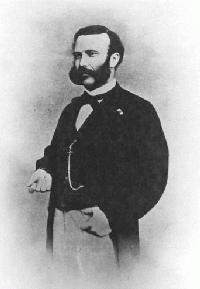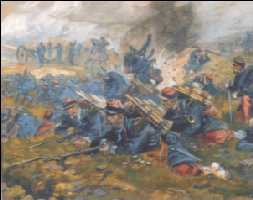His life
Parents
Jean Henry Dunant, known as the father of the Red Cross, was born on May 8, 1828 in Geneva, Switzerland. His father, a successful businessman and a citizen of some prominence, was a man of means. His mother was a gentle an pious woman. She, more than anyone else, was responsible for her first-born child’s early education. Her influence had much to do with molding his character.
Youth
As Dunant grew to manhood he enjoyed all the privileges accruing to him by virtue of his family’s social and economic position. At the same time, he experienced the disciplines usual to the son of a responsible Swiss citizen. The atmosphere of Calvinist Geneva also influenced his growth and development. He developed deep religious convictions and high moral principles early in life.
Charitable activities
In the first years of his maturity he found outlet for his energies by allying himself with various movements or causes and by engaging in charitable and religious activities. For a time he was active in a movement- then quite strong in may parts of Europe- for the union of Christians an Jews. He became a member of an organization in Geneva known as the League of Aims, whose purpose was to bring spiritual and material comfort and aid to the poor, sick, and afflicted. He was also a regular visitor to the city prison, where he labored to help reform transgressors of the law.
International youth movement
Until he was nearly 30 years of age, however, Dunant’s keenest interest was in a group of organizations in Switzerland, France, and Belgium operating under the name of `The Young Men´s Union`. These were European counterparts of the newly formed Young Men´s Christian Association in England. In early 1853 a movement was begun to federate the `Unions` into one organization. Dunant steadfastly opposed the plan as too limited, making the counterproposal that a `World Union` to include the YMCA should be organized. Largely as a result of Dunant`s persistence, this was done at the first world conference of the YMCA, held in Paris in 1855.
Businessman
 Despite Dunant´s dedication to causes of this sort, he did not limit his activities to them. He was engaged also in laying the foundation for and embarking upon, a business career as well. In 1849 he was apprenticed to a banking house in Geneva to learn the banking business. So well did he progress that, in 1853, he was given a temporary appointment as general manager of a subsidiary enterprise of his firm in Algeria, known as ´Colonies Suisses de Setif´. Later he severed his connections with the company and went into business for himself. The energetic young man seemed headed for a successful business career and the acquiring of a substantial fortune.
Despite Dunant´s dedication to causes of this sort, he did not limit his activities to them. He was engaged also in laying the foundation for and embarking upon, a business career as well. In 1849 he was apprenticed to a banking house in Geneva to learn the banking business. So well did he progress that, in 1853, he was given a temporary appointment as general manager of a subsidiary enterprise of his firm in Algeria, known as ´Colonies Suisses de Setif´. Later he severed his connections with the company and went into business for himself. The energetic young man seemed headed for a successful business career and the acquiring of a substantial fortune.
Confrontation with the war
 It was while yourneying on a business mission in Italy that Dunant chanced to arrive in Castiglione delta Pieve on the same day in June 1859 that the Battle of Solferino was fought nearby. When the town filled with casualties and the army medical services available at that point proved to be inadequate, it was wholly natural for Dunant to try to help relieve the pain and suffering of the wounded. By temperament, tradition, and training, he could do no less. This experience completely changed the course of his life. From that time forward Dunant´s business activities and other interests became secondary as he sought to find a way in which such suffering could somehow be prevented, or at least ameliorated, in future wars.
It was while yourneying on a business mission in Italy that Dunant chanced to arrive in Castiglione delta Pieve on the same day in June 1859 that the Battle of Solferino was fought nearby. When the town filled with casualties and the army medical services available at that point proved to be inadequate, it was wholly natural for Dunant to try to help relieve the pain and suffering of the wounded. By temperament, tradition, and training, he could do no less. This experience completely changed the course of his life. From that time forward Dunant´s business activities and other interests became secondary as he sought to find a way in which such suffering could somehow be prevented, or at least ameliorated, in future wars.
To an international medical war help organisation
The publication of A Memory of Solferino marked the beginning of a brief period in which Dunant reached the pinnacle of his career. His proposal that societies of trained volunteers be organized in all countries for the purpose of helping to care for wounded combatants in time of war was enthusiastically endorsed by many persons. Furthermore, his concept of an international treaty among nations to assure more humane care of the wounded aroused considerable interest. Dunant travelled to many of the capitals of Europe. All doors were open to him, and he was able to talk directly to many influential persons. Royalty and commoners alike listened respectfully to Dunant as he explained his proposals. If some of his audience doubted the feasibility of what he urged, nevertheless they listened. It was an exhilarating experience for this young man who had come without warning from obscurity to touch the heart and stir the conscience of Europe.
Dream becomes reality but ...
In the years 1863 and 1864 Dunant's star reached its zenith and then began almost immediately to decline. People rallied to his support, a committee was organized, and conferences were held. But during the transformation of his dream into reality, Dunant, the visionary, gradually moved aside as more practical men began to take over. The years 1865 and 1866 were marked by a further decline in his participation in the movement that his proposals had generated. Dunant's shyness or diffidence was in part responsible for this: the young man who was so eloquent and so convincing with his pen and in conversation had strangely little to say or offer in meetings and conferences.
Catastrophe
The year 1867 was catastrophic for Dunant. His long-neglected business enterprises had to be liquidated. In the process he surrendered practically everything he owned in an effort to satisfy his creditors. Soon thereafter he left Geneva never to return. He was just 39 years old at the time.
Living in obscurity
The next 20 years were difficult indeed for Dunant. He lived precariously on the pittances friends could give him and a small allowance from members of his family. Poverty and want were no strangers to him. Occasionally he would reappear briefly before the public, in France, Germany, Italy, and in England, to be honored for his part in the founding of the Red Cross or in connection with other projects with which he had identified himself. Much of the time, however, he lived in obscurity.
Back to Switserland
 Suddenly, one day in July 1887, an old man appeared in the little town of Heiden, Switzerland. The towns people soon learned that it was Dunant. Although he was only 59 years of age, two decades of disappointment and want had aged him prematurely. In his new home, several persons befriended him and accorded him the respect that was his due, and for a time he continued to have a lively interest in the progress made in the movement he had done so much for. Occasionally he heard from or was sought out by the few friends and former patrons who were aware that he was still alive. About 1892, ill health and advancing age finally forced him to take up residence in the local hospital where he lived for the last 18 years of his life.
Suddenly, one day in July 1887, an old man appeared in the little town of Heiden, Switzerland. The towns people soon learned that it was Dunant. Although he was only 59 years of age, two decades of disappointment and want had aged him prematurely. In his new home, several persons befriended him and accorded him the respect that was his due, and for a time he continued to have a lively interest in the progress made in the movement he had done so much for. Occasionally he heard from or was sought out by the few friends and former patrons who were aware that he was still alive. About 1892, ill health and advancing age finally forced him to take up residence in the local hospital where he lived for the last 18 years of his life.
Deserved recognition
In 1895 a young journalist on an expedition in the mountains near Heiden heard about Dunant and sought an interview with him. Within a few days the world learned that Dunant was still alive although living under somewhat austere conditions for a person who had given the world so much. Offers to help poured in; acknowledgments of his great service came through the mail, from the high and the lowly, in near and far places. Pope Leo XIII sent him his signed portrait, on which was inscribed in his own hand the words "Fiat pax in virtute tua Deus". Dunant, calm in the serenity of age, appreciated the accolades bestowed upon him. He made it clear, however, that he did not need help; his few simple needs were more than adequately met by the hospital and his neighbours in Heiden.
Nobel peace prize
One climaxing honour remained for Dunant. In 1901 the Nobel committee awarded him its first Peace Prize, shared jointly with the Frenchman Frederic Passy. Since Dunant was too feeble to make the long journey to Christiania the prize and, later, the medal were sent to him. From Geneva, his old home, came this message from the International Committee of the Red Cross: There is no man who more deserves this honour, for it was you, fourty years ago, who set on foot the international organization for the relief of the wounded on the battlefield. Without you, the Red Cross, the supreme humanitarian achievement of the nineteenth century, would probably never have been undertaken.
Decease
On Sunday, October 30, 1910, Jean Henry Dunant died at Heiden, among the mountains and the people where he had found peace of mind, friendship, and a haven of security.
| Table of contents | continue |